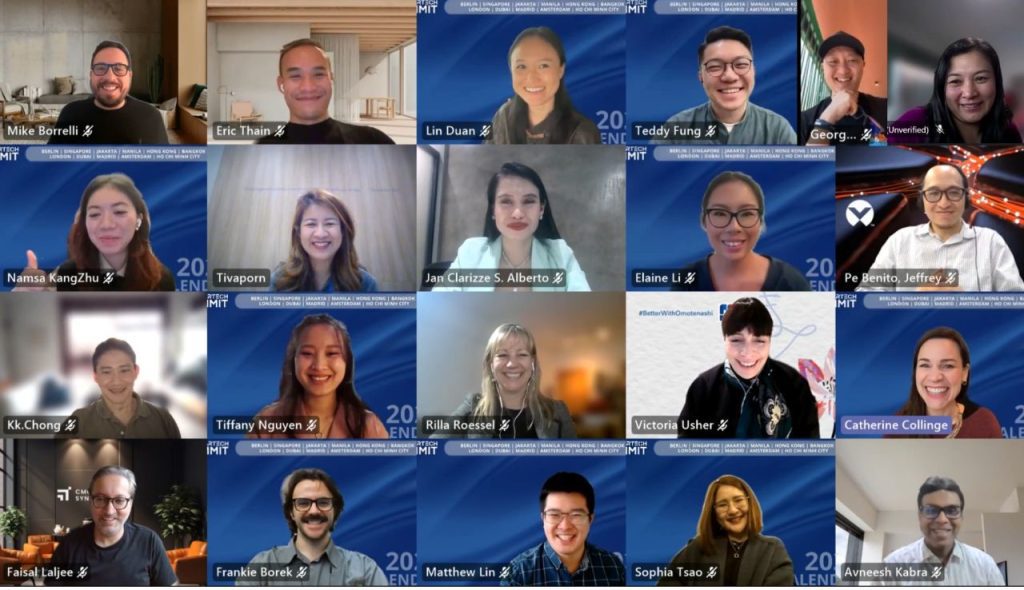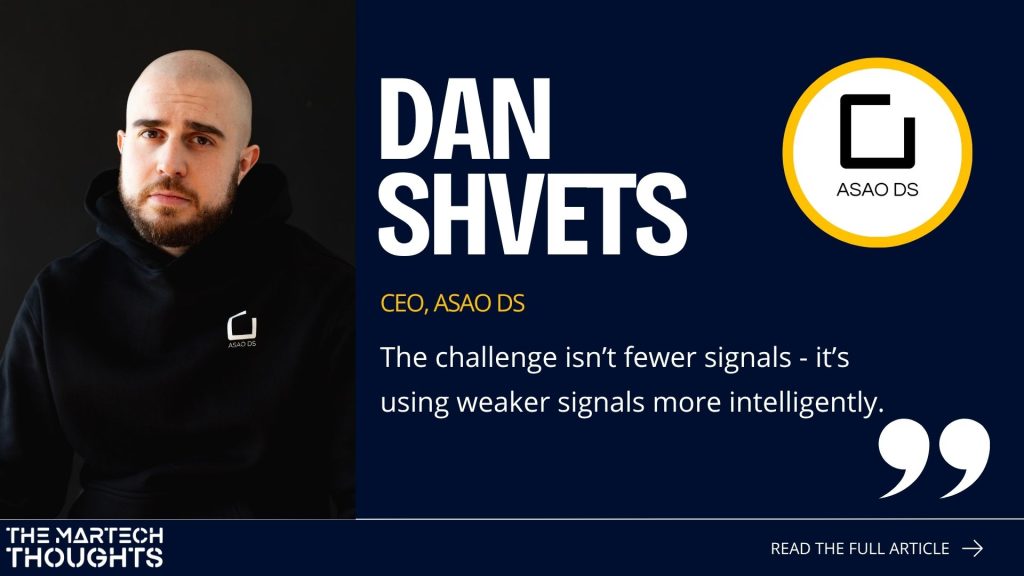Overview
On January 22, 2025, the Advisory Board convened senior marketing and technology leaders to explore challenges and opportunities in the MarTech landscape. This session focused on technological trends, AI integration, and innovative strategies for improving event feedback mechanisms. Below is a summary of key insights, challenges, and actionable recommendations to inform upcoming MarTech Summits and organisational strategies.

Discussion Highlights:
What is the one key challenge marketers face in adopting MarTech solutions?
Budget Constraints and ROI Expectations
- Insight: Budgets are shrinking while expectations from senior leadership continue to grow. Marketers face difficulties in distinguishing high-value AI solutions from overhyped tools. Multiple members, including Mike Borrelli & Victoria Usher, highlighted that marketing budgets are continuously decreasing while expectations remain high. Subsidiaries must compete with global teams for limited budgets, and budget approvals require justification against core business objectives.
- Updated Approach: To address this, businesses should adopt a more structured evaluation of AI tools, prioritising investments that provide immediate and measurable returns.
Skill Gaps and AI Integration
- Insight: Teams lack expertise in maximising AI tools, which complicates adoption and implementation. Eric Thain & Jeffrey Pe Benito stressed that generative AI solutions are flooding the market, making it difficult to assess their true value. AI learning curves are steep, and many teams lack formal training.
- Updated Approach: Companies should implement structured AI training programs and appoint a dedicated AI lead (such as a CIO or Digital Transformation Head) to oversee AI adoption and cross-functional integration.
Centralised vs. Decentralised Operations
- Insight: Centralised marketing technology teams often prioritise enterprise-wide goals, leaving department-specific needs underserved. Rilla Roessel & Avneesh Kabra shared that decision-making delays and competing priorities make it challenging to implement timely solutions. Local teams often lack autonomy in MarTech decision-making.
- Updated Approach: Organisations should streamline internal approval processes and give departments more autonomy over certain aspects of MarTech implementation.
How can we collect real-time feedback from attendees to improve event experiences?
Current Practices
- QR Codes and Surveys: Used to gather feedback post-event but suffer from low response rates.
Proposed Enhancements
- Session-Specific Feedback: Faisal Laljee suggested sending push notifications or SMS prompts during breaks to capture real-time session feedback while attendees are still engaged.
- VIP Engagement: Rilla Roessel recommended pre-selecting key attendees and conducting personalised post-event follow-ups for in-depth insights.
- Gamification: Avneesh Kabra proposed introducing virtual currency incentives that could be used for discounts on future events in exchange for feedback.
- Facilitated Discussions: KK Chong noted that small-group breakout sessions where attendees discuss key topics increase qualitative feedback.
What emerging trends in MarTech and AI are shaping marketing strategies?
Generative AI and Data Fragmentation
- Insight: AI-powered sentiment analysis, content creation, and predictive modeling are gaining traction but pose challenges in data quality and integration. Eric Thain & Jeffrey Pe Benito stressed that fragmented and inconsistent data sources make it difficult to implement AI effectively. AI is often implemented in silos across different functions.
- Updated Approach: AI adoption should be aligned with specific organisational goals and integrated within existing workflows to ensure seamless data utilisation across departments.
AI Oversight and Implementation Strategy
- Insight: There is no clear ownership of AI initiatives within organizations, leading to fragmented implementations. Mike Borrelli highlighted the need for a centralised AI leadership role. Some organisations have AI-driven by sales, while others lack clear oversight.
- Updated Approach: Organisations should appoint a designated AI leader (e.g., CIO, CMO, or Digital Transformation Head) responsible for ensuring AI is adopted strategically and across relevant business functions.
KOL & Recourse Recommendation (Access list HERE)
What should future MarTech Summits focus on?
Proposed Themes
- Integrated Marketing: Strategies that combine branding, CRM, and performance marketing.
- AI in Marketing: Practical applications, real-world ROI measurement, and ethical concerns.
- Real-Time Feedback Technologies: Innovations that enhance attendee engagement and data collection.
- Sustainability in Marketing: How MarTech can support eco-friendly and ethical marketing strategies.
Speaker Representation
- Feature thought leaders and innovators who have successfully implemented AI-driven MarTech solutions.
- Include diverse industry perspectives to showcase unique challenges and solutions across sectors.
Feedback Summary from Breakout Rooms
Challenges in Adopting MarTech Solutions
- Budget constraints continue to be a primary concern, with marketing teams competing for limited resources.
- AI adoption is hindered by a lack of expertise and the overwhelming number of new tools entering the market.
- Centralised decision-making often delays MarTech implementation, making it difficult for regional teams to act independently.
Enhancing Real-Time Feedback Collection
- Attendees are more likely to respond to feedback requests if they receive them during breaks rather than at the end of an event.
- VIP attendees should be engaged in personalised follow-ups to gather in-depth insights.
- Incentivising feedback through gamification strategies, such as virtual currency, could improve response rates.
- Small-group discussions and workshops facilitate more substantial feedback.
Emerging Trends in MarTech and AI
- Generative AI is revolutionising content creation and sentiment analysis, but data fragmentation remains a challenge.
- Organisations need a structured AI leadership role to oversee adoption and integration across various business functions.
- AI should align with business goals rather than be implemented in silos within different departments.
Future Summit Themes
- The importance of sustainability in MarTech should be explored further, focusing on eco-friendly marketing solutions.
- AI in Marketing needs to be addressed through practical applications and measurable ROI case studies.
- Interactive formats such as live polling and targeted breakout discussions should be incorporated into event structures.
Conclusion
Target Speaker Suggestions:
This Advisory Board session provided valuable insights into the evolving MarTech landscape, emphasizing the need for budget-conscious innovation, AI integration, and improved feedback mechanisms. Addressing these challenges through structured training, centralized AI oversight, and enhanced feedback collection will ensure MarTech Summits remain impactful and relevant.
Thank you to all members for their contributions. We look forward to our next session and continued collaboration.
Advisory Board Members present:
- Tivaporn Hanbunjerd, Market & Customer Insight Lead, Roche Thailand Ltd.
- Rilla Roessel, VP, Growth Marketing, INTO GLOBAL
- Tanya Manyan, Regional Head of Marketing, ANZ, International SOS
- Avneesh Kabra, Marketing Manager (APAC & MEA), Arxada
- Jeffrey Pe Benito, Digital Marketing Director, Vertiv.com
- Eric Thain, Former Director, Customer & Brand, HK Express, e&r
- Mike Borrelli, Global Functional Lead & Sr. Product Owner – Marketing Technology – Activation Platforms, Henkel
- George Wong, Country Manager – PH, MY & ID / SEA Partnerships, The Sandbox
- KK Chong, Head of Sustainable Development, Delta Electronics Thailand
- Faisal Laljee, Chief Marketing Officer, The CMO Syndicate
- Jan Clarizze Alberto, Head, Marketing, Corporate Communications & Center for Patient Experience, The Medical City South Luzon
- Victoria Perea-Usher, Vice President, Marketing Communications, JCB International (Europe) Ltd.
Stay tuned for more to come by following our social media accounts and joining The MarTech Community on Slack!
Team BEETc














